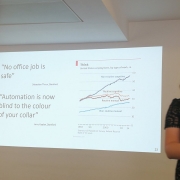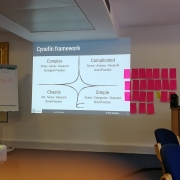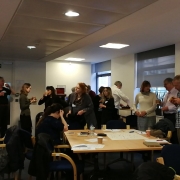November 2018 Seminar: The Networkness of Networks
Summary
At this meeting Yasmin Merali, Professor of Systems Thinking and Director of the Centre for Systems Studies at Hull University Business School, and Drew Mackie gave an introduction to network science and demonstrated some practical applications.
Speakers
Yasmin Merali is Professor of Systems Thinking and Director of the Centre for Systems Studies at Hull University Business School. Prior to that she was Co-director of the Doctoral Training Centre for Complexity Science at the University of Warwick and served as Director of Warwick Business School’s Information Systems Research Unit until 2006. Professor Merali is an Expert Evaluator for the EU and was elected to the Executive Committee of the Council of the European Complex Systems Society in 2012 and the Board of the UNESCO Unitwin Complex Systems Digital Campus in 2013. Her research is trans-disciplinary, using complexity theory to address issues of transformation in internet-enabled socio-economic contexts, focusing on network dynamics and the emergence and co-evolution of socio-economic structures. She has extensive consultancy experience in public, private, and third sector organizations, and received a BT Fellowship and an IBM Faculty Award for her work on knowledge management and complexity.
Drew Mackie is a recognised expert in the Kumu online system of network visualisation and is particularly interested in using network methods to evaluate changes in connectivity over the life of projects.
Drew has been active in the Joined Up Digital project for the Centre for Ageing Better, following an exploration into Living Well in the Digital Age with the Age Action Alliance. He has also been involved in social network mapping for the Croydon Best Start programme.
Time and Venue
2pm on 15th November 2018, The British Dental Association, 64 Wimpole Street, London W1G 8YS
Pre Event Information
The internet and advances in information and communications are implicated in the emergence of the network economy and the network society. Greater connectivity and access to increased variety and volume of information enable new and complex forms of organisation. This presents opportunities and threats that are challenging both, public and private sector institutions.
This session looks at the quest for more effective ways of dealing with the uncertainties and dynamism of the network economy whilst maximising the opportunities afforded by the Internet and associated technologies. The main speaker was Professor Yasmin Merali, who explores how understanding the “networkness” of networks may enable us to understand the emerging context and to harness network forms of organisation to deliver transformational capacity or stability as appropriate in the face of environmental turbulence.
The afternoon will then feature practical discussion, in which those present can share examples from their own experience. This will be facilitated by Drew Mackie, who has a huge range of practical expertise working in this field.
This seminar will be our ‘Community Network’ meeting to which we welcome practitioners from our colleagues in other IKM networks as our guests.
Slides
No slides available
Tweets
#netikx95 There were no tweets from this meeting due to a power cut.
Blog
See our blog report: Networks
Study Suggestions
Have a look at the Centre for Systems Studies at Hull University: https://www.google.com/search?client=firefox-b-d&q=Centre+for+Systems+Studies+%7C+University+of+Hull




